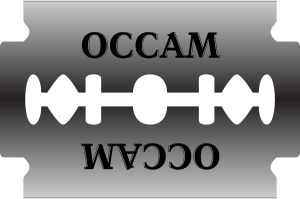موسى اوكام
(تم التحويل من مقص أوكام)

It is possible to describe the other planets in the solar system as revolving around the Earth, but that explanation is unnecessarily complex compared to the contemporary consensus that all planets in the solar system revolve around the Sun.
موسى اوكان (Occam's razor، من اللاتينية lex parsimoniae) هو المبدأ يعتمد على أن شرح أي ظاهرة يجب أن يقوم على أقل عدد من الفرضيات. يتم ذلك بترك أي فرضية لا تؤثر أو تشرح الظاهرة أو النظرية. وسميت باسم الفيلسوف وعالم اللاهوت الإنگليزي وليام من اوكام
نظرة عامة
التاريخ
أكد هذا الفيلسوف في كتاباته على المبدأ الأرسطي القائل بأنه لا تجب مضاعفة الكينونات لأبعد مما هو ضروري. وعرف هذا المبدأ بـموسى أكام. وفي الفلسفة، وفقًا لمبدأ موسى أكام؛ فإنه يجب أن تُبيَّن المعضلة بأبسط عباراتها الأساسية. أما في العلوم، فإنه ينبغي اختيار أبسط نظرية تناسب حقائق المعضلة.
المبررات
الجمال
اللسنيات
التجريبية
اختبار الموسى

Possible explanations can get needlessly complex. It is coherent, for instance, to add the involvement of Leprechauns to any explanation, but Occam's razor would prevent such additions, unless they were necessary.
اعتبارات علمية وپاراگماتية
الرياضيات
آراء أخرى
كارل پوپر
إليوت سوبر
ريتشارد سوينبرن
لوديگ ويتگنشتاين
التطبيقات
العلوم والمنهج العلومي
علم الأحياء
الطب
الدين
وجود الله
فلسفة العقل
عقوبات أخلاقية
نظرية الاحتمالات والاحصاء
هدف الموسى
في الأدب والكتابة
في علم النفس والفكاهة
نقد
انظر أيضاً
3
المصادر
قراءات إضافية
- Ariew, Roger (1976). Ockham's Razor: A Historical and Philosophical Analysis of Ockham's Principle of Parsimony. Champaign-Urbana, University of Illinois.
- Charlesworth, M. J. (1956). "Aristotle's Razor". Philosophical Studies (Ireland)[مطلوب توضيح]. 6: 105–112.
- Churchland, Paul M. (1984). Matter and Consciousness. Cambridge, Massachusetts: MIT Press. ISBN 0-262-53050-3. ISBN.
- Crick, Francis H. C. (1988). What Mad Pursuit: A Personal View of Scientific Discovery. New York, New York: Basic Books. ISBN 0-465-09137-7. ISBN.
- Dowe, David L. (2007). "Bayes not Bust! Why Simplicity is no Problem for Bayesians". British J. for the Philosophy of Science. 58 (4): 709–754. doi:10.1093/bjps/axm033. Retrieved 2007-09-24.
{{cite journal}}: External link in|journal=|coauthors=ignored (|author=suggested) (help); Unknown parameter|month=ignored (help) - Duda, Richard O. (2000). Pattern Classification (2nd ed.). Wiley-Interscience. pp. 487–489. ISBN 0-471-05669-3. ISBN.
{{cite book}}: Unknown parameter|coauthors=ignored (|author=suggested) (help) - Epstein, Robert (1984). "The Principle of Parsimony and Some Applications in Psychology". Journal of Mind Behavior. 5: 119–130.
- Hoffmann, Roald (1997). "Ockham's Razor and Chemistry". HYLE—International Journal for the Philosophy of Chemistry. 3: 3–28. Retrieved 2006-04-14.
{{cite journal}}: Unknown parameter|coauthors=ignored (|author=suggested) (help) - Jacquette, Dale (1994). Philosophy of Mind. Engleswoods Cliffs, New Jersey: Prentice Hall. pp. 34–36. ISBN 0-13-030933-8. ISBN.
- Jaynes, Edwin Thompson (1994). "Model Comparison and Robustness". Probability Theory: The Logic of Science. ISBN 0-521-59271-2.
{{cite book}}: External link in|chapterurl=|chapterurl=ignored (|chapter-url=suggested) (help) - Jefferys, William H. (1991). "Ockham's Razor and Bayesian Statistics (Preprint available as "Sharpening Occam's Razor on a Bayesian Strop)"," (PDF). American Scientist. 80: 64–72.
{{cite journal}}: Unknown parameter|coauthors=ignored (|author=suggested) (help) - Katz, Jerrold (1998). Realistic Rationalism. MIT Press. ISBN 0-262-11229-9.
- Kneale, William (1962). The Development of Logic. London: Oxford University Press. p. 243. ISBN 0-19-824183-6. ISBN.
{{cite book}}: Unknown parameter|coauthors=ignored (|author=suggested) (help) - MacKay, David J. C. (2003). Information Theory, Inference and Learning Algorithms. Cambridge University Press. ISBN 0-521-64298-1. ISBN.
- Maurer, A. (1984). "Ockham's Razor and Chatton's Anti-Razor". Medieval Studies. 46: 463–475.
- McDonald, William (2005). "Søren Kierkegaard". Stanford Encyclopedia of Philosophy. Retrieved 2006-04-14.
- Menger, Karl (1960). "A Counterpart of Ockham's Razor in Pure and Applied Mathematics: Ontological Uses". Synthese. 12 (4): 415. doi:10.1007/BF00485426.
- Morgan, C. Lloyd (1903). "Other Minds than Ours". An Introduction to Comparative Psychology (2nd ed.). London: W. Scott. p. 59. ISBN 0-89093-171-2. Retrieved 2006-04-15.
{{cite book}}: External link in|chapterurl=|chapterurl=ignored (|chapter-url=suggested) (help) - Nolan, D. (1997). "Quantitative Parsimony". British Journal for the Philosophy of Science. 48 (3): 329–343. doi:10.1093/bjps/48.3.329.
- Pegis, A. C., translator (1945). Basic Writings of St. Thomas Aquinas. New York: Random House. p. 129. ISBN 0-87220-380-8.
{{cite book}}:|first=has generic name (help)CS1 maint: multiple names: authors list (link) - Popper, Karl (1992). "7. Simplicity". The Logic of Scientific Discovery (2nd ed.). London: Routledge. pp. 121–132. ISBN 84-309-0711-4.
- Rodríguez-Fernández, J. L. (1999). "Ockham's Razor". Endeavour. 23 (3): 121–125. doi:10.1016/S0160-9327(99)01199-0.
- Schmitt, Gavin C. (2005). "Ockham's Razor Suggests Atheism". Archived from the original on 2007-02-11. Retrieved 2006-04-15.
- Smart, J. J. C. (1959). "Sensations and Brain Processes". Philosophical Review. The Philosophical Review, Vol. 68, No. 2. 68 (2): 141–156. doi:10.2307/2182164. JSTOR 2182164.
- Sober, Elliott (1975). Simplicity. Oxford: Oxford University Press.
- Sober, Elliott (1981). "The Principle of Parsimony". British Journal for the Philosophy of Science. 32 (2): 145–156. doi:10.1093/bjps/32.2.145.
- Sober, Elliott (1990). "Let's Razor Ockham's Razor". In Dudley Knowles (ed.). Explanation and its Limits. Cambridge: Cambridge University Press. pp. 73–94. ISBN.
- Sober, Elliott (2001). Zellner; et al. (eds.). "What is the Problem of Simplicity?" (PDF). Retrieved 2006-04-15.
{{cite web}}: Explicit use of et al. in:|editor=(help) - Swinburne, Richard (1997). Simplicity as Evidence for Truth. Milwaukee, Wisconsin: Marquette University Press. ISBN 0-87462-164-X.
- Thorburn, W. M. (1918). "The Myth of Occam's Razor". Mind. 27 (107): 345–353. doi:10.1093/mind/XXVII.3.345.
- Williams, George C. (1966). Adaptation and natural selection: A Critique of some Current Evolutionary Thought. Princeton, New Jersey: Princeton University Press. ISBN 0-691-02615-7. ISBN.
وصلات خارجية
- What is Occam's Razor? This essay distinguishes Occam's razor (used for theories with identical predictions) from the Principle of Parsimony (which can be applied to theories with different predictions).
- Skeptic's Dictionary: Occam's Razor
- Ockham's Razor, an essay at The Galilean Library on the historical and philosophical implications by Paul Newall.
- The Razor in the Toolbox: The history, use, and abuse of Occam’s razor, by Robert Novella
- NIPS 2001 Workshop "Foundations of Occam's Razor and parsimony in learning"
- Simplicity at Stanford Encyclopedia of Philosophy
- Occam's Razor على بلانيت ماث
- Humorous corollary "Rev. Nocents' Toothbrush" (science vs. religion)
- Sherlock Hemlock from Sesame Street – teaching Occam's razor to young children, Sherlock Hemlock comes up with a complex solution to a simple problem. But then reality proves him correct.
- Economic Parsimony in Practice at Pinchtown.com
- short blog entry about statistical parsimony
- Disproof of parsimony as a general principle in science
الكلمات الدالة:
This article contains content from Wikimedia licensed under CC BY-SA 4.0. Please comply with the license terms.
تصنيفات:
- Articles with hatnote templates targeting a nonexistent page
- Pages using columns-list with unknown parameters
- جميع الصفحات التي تحتاج تنظيف
- مقالات بالمعرفة تحتاج توضيح from November 2011
- CS1 errors: unsupported parameter
- CS1 errors: generic name
- Adages
- Reductionism
- Heuristics
- مبادئ
- فكر نقدي
- فلسفة العلوم
- Arguments against the existence of God
- مصطلحات علمية
- علم الوجود

